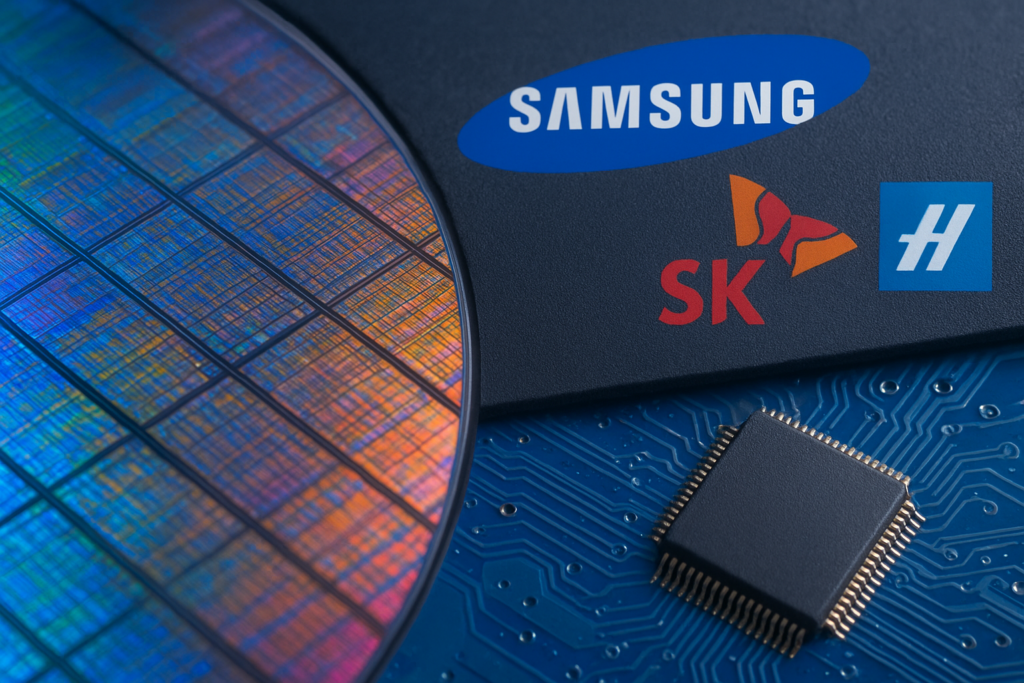The decision to revoke the US chip waiver has sent shockwaves through the global semiconductor industry. For Samsung Electronics and SK Hynix, two of the largest memory chipmakers in the world.
The removal of this regulatory relief by the US Commerce Department represents more than just a bureaucratic change it marks a seismic shift in how technology, politics, and global trade intersect.
Why the US Chip Waiver Was So Important
The US chip waiver allowed Samsung and SK Hynix to import American made chipmaking equipment into their Chinese operations without seeking new licenses for every shipment. This flexibility was critical for two reasons.
Operational Efficiency It enabled smoother supply chain management, ensuring that fabs in China received advanced tools without delays.
Global Supply Stability Since both companies produce massive amounts of memory chips in China, the waiver helped stabilize worldwide supplies of DRAM and NAND.
Now, with the waiver revoked, production faces potential bottlenecks, costs could rise, and global markets may experience ripple effects.
Semiconductors have become the backbone of modern economies, powering AI, smartphones, cloud computing, and even national defense systems. The US views them as a strategic resource, which explains its growing restrictions on exports to China.
The US chip waiver was initially seen as a compromise allowing South Korean companies to operate in China while Washington tightened restrictions on Chinese firms.
Revoking it signals a firmer stance America wants to restrict not just Chinese firms but also limit allied companies’ ability to advance chipmaking in China.
Experts across the industry have weighed in on what the end of the US chip waiver could mean. Dr. Elaine Wong, Semiconductor Policy Expert at MIT, argues.
This is more than a trade measure; it’s a strategic chokepoint. By cutting access, the US is pushing its allies to reduce reliance on China, even at the cost of their short term profits. James Park, Senior Analyst at Nomura Securities, offers a different perspective, The timing could hurt. AI demand is rising sharply, and memory chips are critical.
Disruptions in supply from Samsung and SK Hynix’s Chinese fabs could lead to price hikes globally. Samsung’s Xi’an factory in China is one of the most advanced NAND flash memory facilities in the world. It accounts for nearly 40% of the company’s global NAND output.
Under the US chip waiver, Samsung could seamlessly import critical American equipment. Now, each shipment requires license approvals, which may take weeks or be denied entirely.
If disruptions grow severe, Samsung might have to accelerate shifting production back to South Korea or even to the US. But such a move could cost billions of dollars and years of effort.
SK Hynix’s Wuxi DRAM Facility
SK Hynix’s DRAM fab in Wuxi produces nearly half of its global DRAM supply. These chips are essential for cloud data centers, AI applications, and consumer electronics.
Losing the US chip waiver puts Wuxi at risk of reduced efficiency. While SK Hynix is reportedly exploring Japanese and European equipment alternatives, US aligned restrictions already limit what can be supplied.
Without reliable equipment, production costs will rise, and the global memory market could feel the pressure.
I spoke with a veteran engineer working in Samsung’s Xi’an facility who shared his concerns. We’ve built an ecosystem here over a decade.
But with every policy change, our work feels more vulnerable. It’s like building a house on shifting ground you never know if tomorrow’s politics will undo today’s progress.
This reflects the human side of the issue: engineers, managers, and factory workers directly impacted by high-level political decisions.
Winners and Losers in the Short Term
Non Chinese Chip Facilities Plants in South Korea, the US, or elsewhere may benefit as production shifts. US Equipment Makers Demand for licenses could create stronger dependency on US approvals, giving Washington more leverage.
Samsung and SK Hynix Increased costs, uncertainty, and logistical headaches. China’s Tech Ecosystem Domestic companies may face shortages or higher prices for memory chips.
Consumers Worldwide Rising chip costs may eventually push up prices of electronics, from smartphones to laptops.
South Korea’s Delicate Position
For South Korea, this is not just a business issue it’s a national dilemma. Samsung and SK Hynix are pillars of the South Korean economy, yet Seoul depends on Washington for its security umbrella.
Professor Min Jae Lee of Seoul National University put it bluntly, South Korea cannot afford to alienate the US or China. The end of the US chip waiver places Seoul in one of the toughest balancing acts in its modern history.
License Driven Operations Expect delays and uncertainty as Samsung and SK Hynix must seek approval for every shipment. Diversification Strategy Both firms will accelerate investments in South Korea, the US, and possibly India to reduce reliance on China.
China’s Push for Independence These restrictions will likely accelerate China’s long term strategy of semiconductor self sufficiency. The end of the US chip waiver represents a critical turning point in the global semiconductor landscape.
It highlights how deeply intertwined technology and politics have become, where business strategies can be overturned by geopolitical shifts overnight. For Samsung and SK Hynix, the challenge will be adapting production strategies while maintaining global competitiveness.
For the rest of the world, the impact may be felt in higher prices, longer supply chain delays, and the sobering realization that the chips powering our devices are now at the center of one of the fiercest rivalries of our age.

